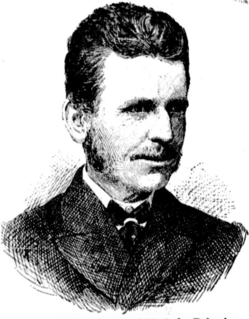
Alban Joseph Riley (8 June 1844 – 24 July 1914) was an Australian politician. He was mayor of the City of Sydney and a Member of the New South Wales Legislative Assembly.

Alban Joseph Riley (8 June 1844 – 24 July 1914) was an Australian politician. He was mayor of the City of Sydney and a Member of the New South Wales Legislative Assembly.
Riley was born at Balmain to softgoods merchant Alban Joseph Riley and Juliana Lyons. He was educated privately at Maitland, and in 1859 was apprenticed to a draper. He established his own branches around 1868 at Bathurst and in 1874 at Maitland. On 4 October 1870 he married Eleanor Harriett Birkenhead, [1] [2] the second daughter of William and Hannah Birkenhead, at Sydney. [3]
In 1878 he visited India, Palestine, Europe and England. He established an export drapery business, AJ Riley & Co, with branches in London, Paris and Sydney. His private residence was Tulloona, in Gloucester Avenue, Burwood. [3]

Riley was a Burwood alderman in 1884. He served on Sydney City Council from 1885 to 1891 and was mayor in 1887. He first stood for the New South Wales Legislative Assembly at the 1885 election for Canterbury, but was unsuccessful by a margin of 133 votes (0.8%). [4] In 1887 he was elected to the Legislative Assembly as a Free Trade member for South Sydney, finishing at the head of the poll, but was defeated in 1889 with a swing to the Protectionists. [5] Appointed to the New South Wales Legislative Council in 1891, he was forced to resign in 1893 when he was declared bankrupt. [1] [6] He was alleged to have continued trading and obtaining credit despite his bankruptcy. [3]
Riley died at his home Tulloona, Park Road, Burwood on 24 July 1914 (aged 70), [1] [7] [8] survived by Eleanor, [9] five sons and five daughters. [3] He was buried in Rookwood Cemetery on 26 July 1914. [10]
The Corn Exchange built in 1887 has his name and that he was mayor in 1887 over the corner door.

Sir George Wigram Allen was an Australian politician and philanthropist. He was Speaker in the New South Wales Legislative Assembly 1875–1883. Allen was held in high esteem. As speaker he showed dignity, courtesy and ability; it was said of him: 'A man of calm judgment and much practical wisdom'.
South Sydney was an electoral district for the Legislative Assembly in the Australian state of New South Wales from 1880 to 1894, covering the southern part of the current Sydney central business district, Haymarket, Surry Hills, Moore Park and Chippendale, bordered by George Street, Broadway, City Road, Cleveland Street, South Dowling Street, Dacey Avenue, the western edge of Centennial Park, Moore Park Road, South Dowling Street, Oxford Street and Liverpool Street. It elected four members simultaneously, with voters casting four votes and the first four candidates being elected. For the 1894 election, it was replaced by the single-member electorates of Sydney-Phillip, Sydney-Belmore, Sydney-Flinders and Sydney-Cook.

Sir Joseph Palmer Abbott, was an Australian politician, pastoralist and solicitor.

John Fletcher Hargrave was a British-born Australian politician and judge.
William Love (1810-1885) was a member of the New South Wales Legislative Assembly for West Sydney from 1860 to 1864. Love served as Chairman of the Sydney Revenues Improvement Bill Committee.

Daniel O'Connor was an Irish-born politician and businessman active in colonial-era New South Wales.

Peter Faucett was an Australian barrister, judge and politician. He was a member of the New South Wales Legislative Assembly between 1856 and 1865. He held the position of Solicitor General in the first government of James Martin. He was a judge of the Supreme Court between 1865 and 1888 and a member of the New South Wales Legislative Council between 1888 and 1894.

John Stuart Hawthorne was an Australian politician.

Richard Thomas Ball was a politician and engineer in New South Wales, Australia.
Charles Hilton Dight was a member of the New South Wales Legislative Assembly.

Sir Robert Wisdom, was a politician in colonial New South Wales and Attorney General of New South Wales.

James Nixon Brunker was an Australian politician, Minister of Lands in the Parliament of New South Wales.

John Fitzgerald Burns was an Australian politician, member of the Parliament of New South Wales, Postmaster-General in the 1870s and Colonial Treasurer in the 1880s.

Joseph Creer was a Manx-born Australian politician and cabinetmaker.

William Lovel Davis was an English-born Australian politician.

John Thomas Gannon was a politician and solicitor in New South Wales, Australia.

Lewis Wolfe Levy was an English-born Australian businessman and politician.
Joseph Chambers was an English-born Australian politician.
Gwydir, an electoral district of the Legislative Assembly in the Australian state of New South Wales had two incarnations, from 1859 until 1894 and from 1904 until 1920.
A by-election was held for the New South Wales Legislative Assembly electorate of Northumberland on 1868 because Atkinson Tighe had been appointed Postmaster-General in the second Martin ministry. Such ministerial by-elections were usually uncontested.